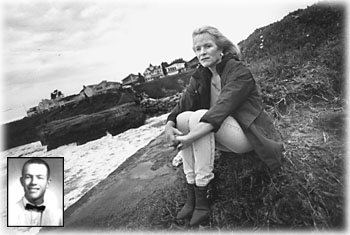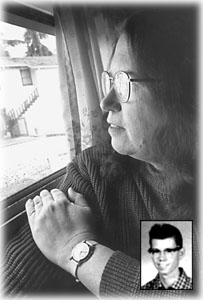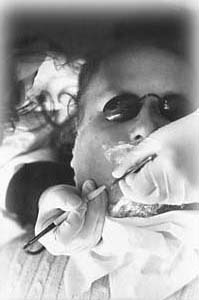![[Metroactive Features]](/features/gifs/feat468.gif)
![[Metroactive Features]](/features/gifs/feat468.gif)
[ Metro | Metroactive Central | Archives ]
Boy Morphs Girl
Woman by Choice: Melinda Whiteway opted for womanhood after 50 years of living as a man.
Never underestimate the power of a woman trapped inside a man's body
By Dale Bryant
I REMEMBER JOHN WHITEWAY as a good-looking youth who walked with a long stride, head held high, chin lifted at an almost arrogant tilt. I remember girls--not any one in particular, but girls--always seemed to be congregating around him.
When my high school graduating class of '61 got together at the Toll House in Los Gatos for our 35th class reunion, John didn't show up. I had been in charge of the invitations and of tracking down lost classmates. Whiteway's invitation came back to my house marked "return to sender." Small wonder we couldn't find our classmate. In the five years since our previous reunion, Whiteway had changed his address, his name and his gender.
For nearly 50 years, Whiteway lived as a male. Twice married, John became Melinda Whiteway, an attorney who works as a deputy sheriff in the Santa Clara County Deputy Reserves. Now, she says, "I'm doing a high-speed 180-degree turn." Last June, Whiteway completed sex reassignment surgery, completing physically a transition that began less than five years earlier.
Unlike transsexuals who know all their lives they are in the wrong body, Whiteway has only in the past few years begun to believe she should have had a female body all along.
What Whiteway did know beginning in early childhood was that as a boy named John, he enjoyed wearing women's clothes. "My first memory of cross-dressing was when I was 7," Whiteway says. "I put on my mother's bathing suit; she thought it was funny, but my father was very upset. I remember being aware from his reaction that this was not appropriate behavior."
Whiteway continued to cross-dress, but in every other way, John Whiteway's life seemed normal. "I dated; I liked girls. My perception was that cross-dressing was just something I liked to do."
When Whiteway's father found John cross-dressing as an adolescent, he confronted his son. "I was embarrassed," Whiteway recalls, "but I continued to cross-dress. Only now it was with a lot of guilt and shame."
Then, as a senior at Los Gatos High School in 1961, John found himself going through a severe depression. "One day I was in my bedroom with a loaded high-powered rifle [aimed] inside my mouth."
These days, sadly, we're not surprised to hear about a teenager attempting suicide. But in 1961 on that idyllic campus nestled against the hills? Most of us who were there dealt with nothing more traumatic than unrequited puppy love. We may have shed some tears over a hoped-for party invitation that never arrived. But in the days when John Kennedy was our handsome young president, most of us were bursting with hope and idealism.
ALTHOUGH WHITEWAY missed the reunion, several coincidences brought her to my office at the Los Gatos Weekly-Times (a Metro community newspaper), where I am the editor.
Just a week before the reunion, a book by Los Gatos therapist Mildred Brown, True Selves, came across my desk. The book was subtitled "Understanding Transsexualism." The subject seemed moderately interesting, but I felt no sense of urgency about following through with it.
Although I wasn't to learn of Whiteway's transition until a few weeks after the reunion, someone else who did attend our reunion sent me racing to my office the following Monday.
On the night of our reunion, I discovered that Denys Fritch (pronounced like Dennis), another of my high school classmates, was also a transsexual. As co-chair of the event, I felt personally responsible for making sure everyone had a good time, that they enjoyed the mounds of hors d'oeuvres, that they felt a little nostalgic listening to Elvis and Johnny Mathis.
A friend who was registering guests called me aside to tell me there had been a mixup over nametags. Denise Fritch, my friend said, directing me to look across the room at the red-haired woman in the forest green dress. Denise Fritch, she repeated, is clearly a woman. The problem was her name tag bore the name Denys, and the photograph, taken from our 1960 yearbook, was of a gangling young teenage boy who stared out from behind a pair of plastic-framed glasses.
I had no idea how the mixup happened, though it was easy enough to understand how confusion would occur under the circumstances. My mind was on other things, so I asked my friend if she would please deal with it. She smoothed over the immediate problem, but it was clear to me that I had questions about Denise Fritch whose answers I would not know until I got back to that book sitting on my desk.
As I discovered later, going to the reunion was something Fritch knew would be difficult, but it was something she believed she had to do. What's more, while thumbing through the yearbooks scattered around on tables, she had made an amazing discovery. There in the senior class pictures, wearing the traditional white jacket and bow tie, was a vaguely familiar face--John Whiteway. Fritch suddenly remembered the two of them had been in a physics class together. Fritch was surprised, for she had never before made the connection. She knew Whiteway as Melinda. They had met through Mildred Brown's therapy groups.
That's how I happened to dig Brown's book out from under a stack of papers in my office, and meet with her and with both of my classmates in the following few weeks.
A local therapist guides gender-dysphoric clients
The south bay is also home to a full-service salon
WHEN WHITEWAY called my office, she identified herself only as a former classmate who'd like to stop by and say hello. I immediately made the connection; the therapist had promised to send over "another client" for an interview.
When Melinda arrived, I invited her into my office, closed the door and pulled up a chair next to her, notebook in hand. We talked for hours, mostly about the turns her life has taken since we roamed the halls of our alma mater, two anxious teenagers wondering what life held for us.
As familiar as she looked to me, I couldn't place Melinda, the only name she gave me. She enjoyed the aura of mystery, insisting that I look in my yearbook later that night to see if I could figure out who she was. She seemed to take great delight in keeping me in the dark about her identity for just a little longer. But she pulled no punches in telling me how she came to know she was living in the wrong body.
After she survived the depression that led to her pointing a loaded gun in her mouth, she said, the cross-dressing disappeared. It was nearly 10 years before it reappeared, this time with a vengeance. "My marriage was on the rocks, and I had just lost a job," Whiteway recalled. "There was a lot of emotional turmoil in my life, and after my marriage broke up, I cross-dressed constantly."
Whiteway now believes that if she hadn't met someone new and remarried, the crisis might have broken down the barriers that kept her from acknowledging the female inside, and she very likely would have transitioned then. When the new relationship started, Whiteway stopped cross-dressing briefly but had started again before the marriage even began. Shortly after the marriage, Whiteway began having panic attacks. "I began to connect my cross-dressing with the panic attacks, and so I contacted a therapist."
The next 15 or so years were spent in therapy trying to "cure" Whiteway. In therapy, she was told cross-dressing was simply a sign of inner conflict. "In the early '70s, no one really knew much about this subject," Whiteway said. "The therapist thought my problem was that I was too driven. We kept trying to figure out how I could relax."
The therapist didn't want to discuss cross-dressing. "I righteously tried not to do it, but I continued to do it in secret. I was a failure as a psychiatric patient," Whiteway said with a laugh.
As the 18-year second marriage began to break up, Whiteway again went through a severe depression and contemplated suicide.
"Finally," Whiteway said, "I had the miraculous good fortune to meet a woman with whom I really clicked. She was the one person who knew about my cross-dressing and was supportive of me."
Whiteway recalled that as John, he frequently cross-dressed when he was with this woman. "Sometimes I'd try to give her a break and dress in male mode. We'd make small talk for a while, and then she'd say: 'Where's Melinda? This guy's a jerk.'"
About the time Whiteway's marriage was breaking up and he began thinking about suicide, he saw a TV show that mentioned the gender dysphoria program at Stanford University Hospital. It took more than a year for Whiteway to get up the nerve to call information to get the phone number and another three months to work up the nerve to call and ask that information be sent. "When I opened it," she recalled, "I was horrified. It had all this information about surgery and hormones. I thought, 'This isn't me; I just like to cross-dress.' "
Whiteway finally sought help in a support group for cross-dressers that met in a San Jose church. One night, Mildred Brown was a guest. "I still didn't think I wanted to transition," Whiteway said. "But I thought I should talk to her sometime."
What interfered once again with the call for help was another relationship. "I met a new girl," Whiteway said. "I was very attracted to her. We got along famously; we had the same interests, and the sex was great."
Then something happened that Whiteway thought was very strange. While living as a man, he had always been sexually active. Six months into this relationship, however, Whiteway began looking for excuses to avoid sex. "It became increasingly difficult to have sex with her until it got to the point that it was an ordeal."
Then John Whiteway had a realization that changed his life forever. "I finally understood that the problem was I didn't want to play the male role. That's when I made an appointment with Millie."
In August 1993, Whiteway went to see Brown as John. "I told her it was just a reality check," Whiteway recalled. "At the end of the session, Millie said, 'I have just one question: Do you want to have another appointment?' I told her I did."
After they'd met for about six months, Whiteway wanted to begin taking female hormones to facilitate physical changes that would make her body more feminine. Brown approved and wrote the required letter. (Most gender therapists, physicians and therapists follow the Standards of Care developed in 1979, which were designed to provide minimum guidelines and standards before clients can begin hormone therapy or sex reassignment therapy. Built-in time constraints are meant to ensure that clients don't rush into such procedures.)
In 1991, Whiteway had already begun the long and painful process of electrolysis, the permanent removal with needles of the hairs on her face. "When I started electrolysis, I still wasn't thinking of transitioning," Whiteway said. "It really was more to accommodate my cross-dressing." She smiles mischievously and adds: "There's nothing worse than cross-dressing with a five-o'clock shadow!"
Beginning in 1990, Whiteway cross-dressed regularly except for seeing clients. Prior to taking the hormones, she had a traceal shave to make her Adam's apple less prominent.
"I still didn't know where I was going with this," Whiteway said, speaking about herself in a detached way, almost as if she were telling a story about someone else. "But I figured I didn't need an Adam's apple."
Whiteway often went to Brown's group therapy sessions in male mode since she came from work and still appeared to her clients as a male. "One day Millie asked all of us to identify our sex. I said both because I still had a male body. But I also realized I was beginning to feel ambivalent."
After Whiteway began hormone therapy, she experienced changes that made her more feminine, including the growth of breasts, softening of the skin and diminished ability to achieve erections. But she worried about the large doses of hormones she was taking. "I actually cut my dosage down because of concerns about the health risk," she says. "Then I heard from several transgendered people who'd had surgery that once they had their testes removed, they needed to take less estrogen."
Whiteway, continuing to talk about herself in a detached way, said: "To tell you the truth, I was curious to find out what life would be like without testosterone." She asked Brown, and the therapist did not object. Whiteway, by now living mostly as a woman, made arrangements with her urologist to have her testes removed. "I was so excited about having surgery. I was like a kid waiting for Christmas."
After the surgery, Whiteway said, she felt very mellow. "I can still be tough," she said. "But I was definitely less aggressive."
She said that having experienced life with testosterone and without it, she can attest to the difference in sex drive experienced by men and women. "Testosterone makes guys want to screw everything," she said.
By now, Whiteway's appearance was changing dramatically. "It was like going through puberty. I was giggly like a teenage girl," Whiteway said, adding, "When your body starts to develop the way you want it to, it's a wonderful feeling."
Femme Finale: After five years of therapy, Melinda Whiteway opted for sex reassignment surgery to complete her transformation from the male image in her high school yearbook to her current female identity.
ALTHOUGH SHE STILL tried to hide her transition in some work situations, she was beginning to tell selected clients about it. Her biggest fear was that she'd lose her job with the Deputy Reserves. But, said Whiteway, Sheriff Charles Gillingham barely blinked at the news. "He called it a 'non-issue' and asked me to draw up a letter he could sign explaining to my co-workers what was happening."
For guidance on what to put in the letter, Whiteway contacted a transsexual woman she knew through a national organization called Transgender Officers Protect and Serve (TOPS). The woman was a fire captain in Los Angeles and shared with Whiteway the letter she had written to announce her transition to co-workers. "The sheriff used the letter almost verbatim," Whiteway said.
Whiteway only wishes the transition had been as smooth with her mother. "She was very upset the first time she saw me in female mode and asked me not to do it around her."
Her mother was devastated, according to Whiteway, when she agreed to see Brown, and the therapist told her that her son was a transsexual.
"She was really sad to be losing a son," Whiteway said, "but I told her I was still the same person, only in a different package."
Whiteway said she and her mother are now simpatico. In fact, said Whiteway, she gets along better with her mother--and virtually everyone she knows--than she ever did as a male.
"Before, I was a facade, the family hero. Now I'm self-confident. What you see is what you get."
Whiteway completed her surgery last June with a vaginoplasty, the surgical creation of a vagina and vulva.
FREQUENTLY, transsexuals move from their communities after transitioning and try to begin new lives, hiding from those they meet that they are transsexuals.
Not Whiteway. "Being sleuth simply means you're hiding again," she said. "Besides, I think people can deal with it if you're honest."
Although Whiteway is a handsome woman, she's quite tall, and her voice is more masculine than feminine. "I'm looking for a way to address the puzzled looks people give me when they meet me for the first time," she said. "I'd like to be able to tell them I'm a transsexual woman without embarrassing them."
Although Whiteway said she's completely comfortable as a female, she sometimes finds it as hard to believe that Melinda has always been inside her as it is to comprehend the changes that have gone on in her life in the last five years.
Still, she said, what makes the most sense is what her therapist says: "Millie tells me that sometimes you put a situation in a box; for some people, the box is made of papier-mâché; for others, it's made of steel. Eventually, though, even steel corrodes."
Cross Purposes: Denys Fritch undergoes electrolysis to remove beard hairs from her face, a minor pain compared to other "horrendous trade-offs" she has suffered to change from a man (above; high school yearbook photograph) to a woman.
LIKE HER CLASSMATE at Los Gatos High School, Denise Fritch was nearly 50 when she recognized that her true self was a woman. Unlike Whiteway, however, Fritch knew very well in high school that something was terribly wrong. As a high school boy, Fritch never looked at girls.
Fritch's parents divorced when he was 4 1/2 years old, and from then on, his mother referred to him as the "man of the house," a phrase that never felt comfortable to the young Fritch.
Until five years ago, Fritch was able to suppress feelings of being the wrong gender. While living as a man, Fritch married and fathered a houseful of children and served for 17 years in the military, the last 10 as an investigator for counterintelligence, retiring on permanent disability with a knee injury. Fritch has an M.B.A., has been a journalist and currently works as a senior technical writer.
It wasn't until five years ago that Fritch began to have strong feelings of being in the wrong body. When she told her spouse what was happening, Fritch said, "my wife said she had known it for 10 years. She told me I had never acted like a man."
By the time Fritch went looking for a therapist, her blood pressure was critical; she was suicidal. "I wasn't looking for just any therapist," Fritch said. "I definitely knew I needed to see someone who specialized in gender issues." She began seeing Mildred Brown in her Pollard Road office two years ago. At the time, Fritch sported a short military haircut; two months later, she wore women's clothes for the first time. She has let her hair grow ever since.
Although she believes she had no choice but to transition to a female, Fritch said she learned the truth of what Brown often tells clients: "Families will accept one of their own as a mass murderer before they'll accept them as a transsexual."
Fritch was banned from her inlaws' home; she said all but one of her children refused to have any contact with her.
"I know this is who I have to be," Fritch said. "But the trade-offs are horrendous." She has no relationship with her brother or sister, and although she would love to have her grandchildren come to visit, they have not.
Fritch said when her father died recently, her family kept her from seeing him in his final months, saying they didn't want Fritch "bothering Dad," a phrase Fritch said was directed at her gender change. The experience was much the same when her mother died, she said.
I have talked with two of Fritch's children, and it is clear that they, too, have suffered much. While Fritch feels the pain of their rejection, they feel betrayed by him. The depth of their embarrassment and anger cannot be overstated. One son said that the only person he could talk to at the time about his feelings was a friend of five years who made himself scarce shortly after he told the friend about his father's transition. "Trying to picture what was happening to my father scared the hell out of me," the son said.
Fritch and I talked a few days after our class reunion. With all she's been through, I asked, why subject herself to a class reunion?
"It was something I had to do," she said. While others at the reunion may have relived for a few brief hours the testosterone charge of the football hero, the delight of having a best friend, the romantic thrill of a prom date, Fritch also relived puberty--this time as a female.
"I kept thinking: I'm here; I'm female; I'm what I want to be."
In the 1 1/2 years she spent at LGHS, Fritch was a soft-spoken, shy male.
"I sat at that reunion, and I recognized some of the guys who were in my P.E. class, and all I could think was: 'Boy, was I in the wrong class!' "
Going to the class reunion was a way for Fritch to close off that part of her past. She didn't stay long, but long enough to experience puberty with others who had experienced it with her some 35 years earlier, this time in her true identity.
Fritch is taking female hormones and is going through electrolysis. Although she has friends who will not return her calls and has encountered some difficulties at work, her company has been supportive, and she kept her job at a Silicon Valley high-tech company after she changed her identity to Denise.
Fritch's divorce becomes final in February. Meanwhile, she's paying off the family's debts. She'd like to have sex reassignment surgery to complete the transition in several years, but with her current financial situation, she hasn't saved any money.
Although she's frequently in touch with other transsexuals, she considers herself outside the transsexual community. "I don't need to go to sessions to learn to sit like a woman," she said.
"There's a difference between a man who tries to be a female and a female," she said. "I've adopted a set of mannerisms for who I am, and I'm comfortable with who I am."
The holidays are particularly difficult, though. "Transsexuals are often shunned by their families," Fritch said. "A lot of transsexuals give each other support on the Internet during the holidays." She maintains a Web page for transsexuals.
Fritch said she plans to come to the next reunion; in fact, she's signed on to work on the reunion committee. With her discovery that her friend Melinda Whiteway was a classmate, someone who shared a physics class with her, the reunion not only provided closure for Fritch on one part of her life, but provided a transition to her world today.
[ Metro | Metroactive Central | Archives ]
This page was designed and created by the Boulevards team.

George Sakkestad![[line]](/gifs/line.gif)
to their true selves.
for cross-dressers and transsexuals.![[line]](/gifs/line.gif)

George Sakkestad

George Sakkestad
From the January 30-February 5, 1997 issue of Metro
Copyright © 1997 Metro Publishing, Inc.